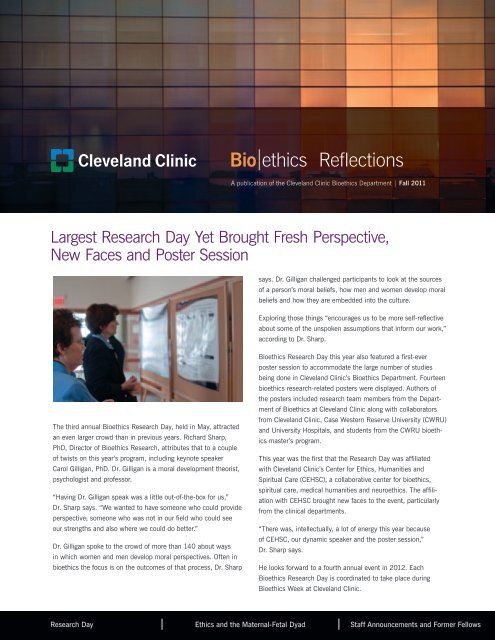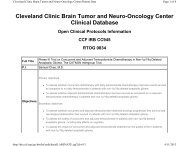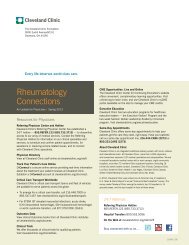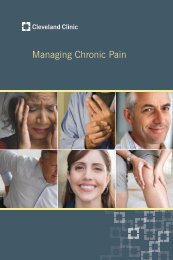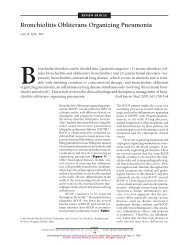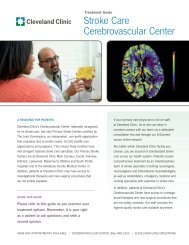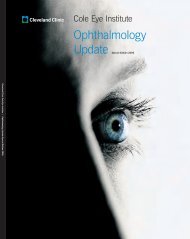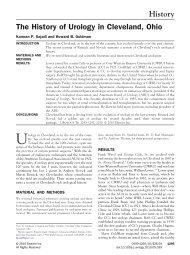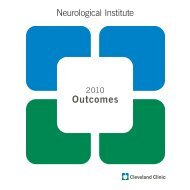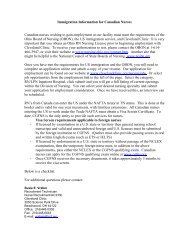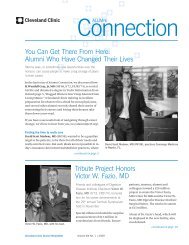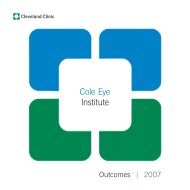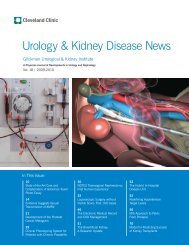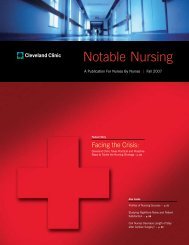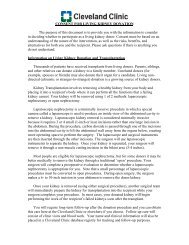Ethics and the Maternal-Fetal Dyad - Cleveland Clinic
Ethics and the Maternal-Fetal Dyad - Cleveland Clinic
Ethics and the Maternal-Fetal Dyad - Cleveland Clinic
You also want an ePaper? Increase the reach of your titles
YUMPU automatically turns print PDFs into web optimized ePapers that Google loves.
The third annual Bioethics Research Day, held in May, attracted<br />
an even larger crowd than in previous years. Richard Sharp,<br />
PhD, Director of Bioethics Research, attributes that to a couple<br />
of twists on this year’s program, including keynote speaker<br />
Carol Gilligan, PhD. Dr. Gilligan is a moral development <strong>the</strong>orist,<br />
psychologist <strong>and</strong> professor.<br />
“Having Dr. Gilligan speak was a little out-of-<strong>the</strong>-box for us,”<br />
Dr. Sharp says. “We wanted to have someone who could provide<br />
perspective; someone who was not in our field who could see<br />
our strengths <strong>and</strong> also where we could do better.”<br />
Dr. Gilligan spoke to <strong>the</strong> crowd of more than 140 about ways<br />
in which women <strong>and</strong> men develop moral perspectives. Often in<br />
bioethics <strong>the</strong> focus is on <strong>the</strong> outcomes of that process, Dr. Sharp<br />
Bio ethics Reflections<br />
A publication of <strong>the</strong> Clevel<strong>and</strong> <strong>Clinic</strong> Bioethics Department | Fall 2011<br />
Largest Research Day Yet Brought Fresh Perspective,<br />
New Faces <strong>and</strong> Poster Session<br />
says. Dr. Gilligan challenged participants to look at <strong>the</strong> sources<br />
of a person’s moral beliefs, how men <strong>and</strong> women develop moral<br />
beliefs <strong>and</strong> how <strong>the</strong>y are embedded into <strong>the</strong> culture.<br />
Exploring those things “encourages us to be more self-reflective<br />
about some of <strong>the</strong> unspoken assumptions that inform our work,”<br />
according to Dr. Sharp.<br />
Bioethics Research Day this year also featured a first-ever<br />
poster session to accommodate <strong>the</strong> large number of studies<br />
being done in Clevel<strong>and</strong> <strong>Clinic</strong>’s Bioethics Department. Fourteen<br />
bioethics research-related posters were displayed. Authors of<br />
<strong>the</strong> posters included research team members from <strong>the</strong> Department<br />
of Bioethics at Clevel<strong>and</strong> <strong>Clinic</strong> along with collaborators<br />
from Clevel<strong>and</strong> <strong>Clinic</strong>, Case Western Reserve University (CWRU)<br />
<strong>and</strong> University Hospitals, <strong>and</strong> students from <strong>the</strong> CWRU bioethics<br />
master’s program.<br />
This year was <strong>the</strong> first that <strong>the</strong> Research Day was affiliated<br />
with Clevel<strong>and</strong> <strong>Clinic</strong>’s Center for <strong>Ethics</strong>, Humanities <strong>and</strong><br />
Spiritual Care (CEHSC), a collaborative center for bioethics,<br />
spiritual care, medical humanities <strong>and</strong> neuroethics. The affiliation<br />
with CEHSC brought new faces to <strong>the</strong> event, particularly<br />
from <strong>the</strong> clinical departments.<br />
“There was, intellectually, a lot of energy this year because<br />
of CEHSC, our dynamic speaker <strong>and</strong> <strong>the</strong> poster session,”<br />
Dr. Sharp says.<br />
He looks forward to a fourth annual event in 2012. Each<br />
Bioethics Research Day is coordinated to take place during<br />
Bioethics Week at Clevel<strong>and</strong> <strong>Clinic</strong>.<br />
Research Day <strong>Ethics</strong> <strong>and</strong> <strong>the</strong> <strong>Maternal</strong>-<strong>Fetal</strong> <strong>Dyad</strong><br />
Staff Announcements <strong>and</strong> Former Fellows
Dear Colleague,<br />
We hope you enjoy reading <strong>the</strong> fall 2011 issue of Bioethics Reflections. As you will<br />
discover from our cover story, bioethics research is thriving at Clevel<strong>and</strong> <strong>Clinic</strong>.<br />
This year’s Bioethics Research Day, <strong>the</strong> third annual, drew a record crowd. It<br />
featured a dynamic <strong>and</strong> iconic keynote speaker, Carol Gilligan, PhD, as well as<br />
a first-ever poster session highlighting current research. We look forward to our<br />
next Research Day in May 2012.<br />
Also in this issue we present <strong>the</strong> ethical issues involved in decision-making regarding<br />
high-risk pregnancies. Decision-making can be very difficult in such situations,<br />
when <strong>the</strong> well-being of both mo<strong>the</strong>r <strong>and</strong> baby are directly connected. Ruth Farrell,<br />
MD, staff member in <strong>the</strong> Department of Bioethics <strong>and</strong> <strong>the</strong> OB/Gyn & Women’s<br />
Health Institute, <strong>and</strong> Jeffrey Chapa, MD, Head of <strong>Maternal</strong>-<strong>Fetal</strong> Medicine in<br />
Clevel<strong>and</strong> <strong>Clinic</strong>’s OB/Gyn & Women’s Health Institute, weigh in on <strong>the</strong> topic.<br />
In our feature highlighting <strong>the</strong> work of former fellows, we talk with Jason Gatliff,<br />
PhD, Integrated <strong>Ethics</strong> Program Officer at <strong>the</strong> Louis Stokes Clevel<strong>and</strong> Veterans<br />
Administration Medical Center <strong>and</strong> Director of <strong>Ethics</strong> Consultation in <strong>the</strong> Center<br />
for Biomedical <strong>Ethics</strong> at MetroHealth Medical Center in Clevel<strong>and</strong>. Dr. Gatliff was<br />
a member of <strong>the</strong> inaugural class in <strong>the</strong> Clevel<strong>and</strong> Fellowship in Advanced Bioethics<br />
(CFAB), beginning in 2007 <strong>and</strong> graduating in 2009.<br />
The Department of Bioethics is pleased to welcome ano<strong>the</strong>r alumna from that class,<br />
Margot Eves, JD, who recently joined our staff as a regional bioethicist. You can<br />
read more about Margot in our next issue.<br />
We appreciate your interest in Bioethics Reflections <strong>and</strong> hope you enjoy reading it.<br />
Sincerely,<br />
Eric Kodish, MD<br />
F.J. O’Neill Professor <strong>and</strong> Chairman,<br />
Clevel<strong>and</strong> <strong>Clinic</strong> Bioethics Department<br />
Bioethics Reflections | Fall 2011<br />
Bioethics Reflections provides<br />
news <strong>and</strong> information from<br />
<strong>the</strong> Clevel<strong>and</strong> <strong>Clinic</strong> Bioethics<br />
Department for our colleagues<br />
across <strong>the</strong> country.<br />
Eric Kodish, MD<br />
Chairman, Department of Bioethics<br />
Barbara Goulden<br />
Administrator, Department<br />
of Bioethics<br />
Bioethics Staff:<br />
Ruth Farrell, MD<br />
Anne Lederman Flamm, JD<br />
Paul Ford, PhD<br />
Martin Kohn, PhD<br />
Carmen Paradis, MD<br />
Richard Sharp, PhD<br />
Martin Smith, STD<br />
Anthony Thomas, MD<br />
Janicemarie Vinicky, PhD<br />
Kathryn Weise, MD, MA<br />
Christine Harrell<br />
Managing Editor<br />
Irwin Krieger<br />
Art Director<br />
Jade Needham<br />
Marketing
<strong>Ethics</strong> <strong>and</strong> <strong>the</strong> <strong>Maternal</strong>-<strong>Fetal</strong> <strong>Dyad</strong>:<br />
Unique Challenges for Patient <strong>and</strong> Provider<br />
The ethical challenges that arise in <strong>the</strong> field of obstetrics are unique<br />
because this field is so different from o<strong>the</strong>r areas of medicine.<br />
Medical professionals are responsible for two patients at <strong>the</strong> same<br />
time: <strong>the</strong> pregnant woman <strong>and</strong> <strong>the</strong> developing fetus. “That’s what<br />
separates obstetrics from o<strong>the</strong>r medical specialties; you have to<br />
consider <strong>the</strong> health of <strong>the</strong> mo<strong>the</strong>r <strong>and</strong> <strong>the</strong> baby,” says Jeffrey Chapa,<br />
MD, Head of <strong>Maternal</strong>-<strong>Fetal</strong> Medicine in Clevel<strong>and</strong> <strong>Clinic</strong>’s OB/Gyn &<br />
Women’s Health Institute. Dilemmas <strong>and</strong> challenges can arise while<br />
trying to safeguard <strong>the</strong> well-being of both.<br />
In many instances, <strong>the</strong>re is agreement between what a physician or<br />
midwife recommends for a pregnant woman <strong>and</strong> what she feels is<br />
an appropriate healthcare plan. But difficulties can arise when <strong>the</strong><br />
choices of <strong>the</strong> pregnant woman do not align with <strong>the</strong> recommendations<br />
of her healthcare provider or, in <strong>the</strong> case of high-risk pregnancies,<br />
<strong>the</strong> multidisciplinary healthcare team. “In such cases, ethics<br />
<strong>and</strong> ethics consultation plays a key role in patient care,” says Ruth<br />
Farrell, MD, MA, Assistant Professor of Surgery at <strong>the</strong> Clevel<strong>and</strong><br />
<strong>Clinic</strong> Lerner College of Medicine <strong>and</strong> a staff member in <strong>the</strong> Department<br />
of Bioethics <strong>and</strong> <strong>the</strong> OB/Gyn & Women’s Health Institute. “The<br />
term ‘maternal-fetal conflict’ does not adequately describe <strong>the</strong> unique<br />
interaction in <strong>the</strong> maternal-fetal dyad. This is an ever-changing <strong>and</strong><br />
unique state in which <strong>the</strong> well-being of <strong>the</strong> mo<strong>the</strong>r <strong>and</strong> <strong>the</strong> fetus are<br />
intertwined. Conflict introduces <strong>the</strong> notion that <strong>the</strong> interests of <strong>the</strong><br />
mo<strong>the</strong>r <strong>and</strong> fetus are in direct contest – something that is rarely <strong>the</strong><br />
case.” Dr. Farrell says that using <strong>the</strong> term maternal-fetal dyad instead<br />
more effectively communicates <strong>the</strong> special state of pregnancy.<br />
New advances in prenatal care can present unique challenges for providers<br />
in balancing <strong>the</strong> health of <strong>the</strong> pregnant woman <strong>and</strong> <strong>the</strong> fetus.<br />
Examples include procedures performed ei<strong>the</strong>r during pregnancy<br />
(such as maternal-fetal surgery) or at <strong>the</strong> time of delivery. Such procedures,<br />
while intended to mitigate <strong>the</strong> effect of a genetic condition or<br />
developmental abnormalities on <strong>the</strong> fetus, do carry important risks for<br />
mo<strong>the</strong>r <strong>and</strong> fetus. “Potential conflicts between <strong>the</strong> provider <strong>and</strong> <strong>the</strong><br />
patient can arise for any procedure, but particularly so when <strong>the</strong>re is<br />
no or scant evidence-based data to demonstrate positive outcomes<br />
with <strong>the</strong> procedure,” says Dr. Farrell. Debate also can arise when<br />
evidence demonstrates a <strong>the</strong>rapeutic promise for <strong>the</strong> newborn but serious<br />
medical complications for <strong>the</strong> mo<strong>the</strong>r, as in <strong>the</strong> case of in-utero<br />
repair of neural tube defects. As technology advances, it’s important<br />
for providers to constantly revisit <strong>the</strong> consideration of what data are<br />
available about outcomes <strong>and</strong> how such procedures affect <strong>the</strong> health<br />
of both mo<strong>the</strong>r <strong>and</strong> fetus.<br />
One example is <strong>the</strong> EXIT (Ex-utero Intrapartum Treatment) procedure,<br />
a surgical procedure performed on a newborn while it is still attached<br />
to <strong>the</strong> umbilical cord to maintain uteroplacental gas exchange. The<br />
procedure was developed to reverse tracheal occlusion in severe congenital<br />
diaphragmatic hernia, <strong>and</strong> has been exp<strong>and</strong>ed to treat o<strong>the</strong>r<br />
indications such as congenital high airway obstruction syndrome,<br />
large fetal neck masses, <strong>and</strong> lung <strong>and</strong> mediastinal tumors.<br />
While <strong>the</strong> EXIT procedure can be lifesaving for <strong>the</strong> newborn, it poses<br />
serious short-term <strong>and</strong> long-term risks for <strong>the</strong> mo<strong>the</strong>r. Like fetal<br />
surgery, <strong>the</strong> EXIT Procedure has a direct impact on a woman’s reproductive<br />
<strong>and</strong> overall health. “Any procedure performed on <strong>the</strong> fetus is<br />
performed on <strong>the</strong> woman, so she must be able to make an informed<br />
decision about whe<strong>the</strong>r <strong>the</strong> procedure is right for her <strong>and</strong> her child,”<br />
says Dr. Farrell.<br />
Whe<strong>the</strong>r a procedure is experimental or established, informed decision-making<br />
<strong>and</strong> communication with <strong>the</strong> patient is critical. “You’ve<br />
got to spend time talking with <strong>the</strong> patient, especially when explaining<br />
complicated procedures,” says Dr. Chapa. “It’s important to give <strong>the</strong><br />
patient detailed information <strong>and</strong> allow her to choose.”<br />
In addition, Dr. Farrell emphasizes <strong>the</strong> importance of informed<br />
decision-making. “It is not enough to give <strong>the</strong> patient a laundry list<br />
of risks <strong>and</strong> expect her to make a decision. The process of informed<br />
decision- making involves having important data, but also being able<br />
to align that information with personal values <strong>and</strong> beliefs. As healthcare<br />
providers, we must help our patients make informed decisions<br />
that meet <strong>the</strong>ir needs as <strong>the</strong>y are <strong>the</strong> ones who must carry on after<br />
<strong>the</strong> delivery.”<br />
Practitioners need to be vigilant in how <strong>the</strong>y frame information so<br />
<strong>the</strong>y don’t bias <strong>the</strong> patient’s decision in a way that does not meet<br />
her healthcare goals. “Many times, <strong>the</strong>re may be <strong>the</strong> hope of ‘doing<br />
something’ to try to improve <strong>the</strong> health of <strong>the</strong> child. However, in<br />
<strong>the</strong>se instances, <strong>the</strong>re is <strong>the</strong> risk that information could be framed in<br />
a way that places undue burden on <strong>the</strong> pregnant women to go ahead<br />
with a procedure. It is vital that healthcare providers present patients<br />
with <strong>the</strong> scientific evidence, including risks <strong>and</strong> benefits, <strong>the</strong> knowns<br />
<strong>and</strong> <strong>the</strong> unknowns in a meaningful way <strong>and</strong> support <strong>the</strong> woman in<br />
making a decision that reflects her values <strong>and</strong> beliefs,” says Dr. Farrell.<br />
Sometimes, when a patient is uncertain about a recommended procedure,<br />
Dr. Chapa may refer her for a second opinion. “It may help<br />
<strong>the</strong> patient to hear ano<strong>the</strong>r perspective,” he says.<br />
Bioethics Reflections | Fall 2011 clevel<strong>and</strong>clinic.org/bioethics | Phone: 216.444.8720
When a patient’s choices appear to not be in agreement<br />
with <strong>the</strong> clinical plan or recommendations, <strong>the</strong> provider<br />
may uncover <strong>the</strong> reason by asking questions <strong>and</strong> getting<br />
to know <strong>the</strong> patient better. “There may be something <strong>the</strong><br />
patient isn’t telling you. You don’t know all <strong>the</strong> circumstances,”<br />
says Dr. Chapa. When he learned that one of<br />
his patients wasn’t taking her medication because it was<br />
too expensive, Dr. Chapa was able to switch her to a less<br />
expensive formulation.<br />
Dr. Farrell also is an advocate for giving patients <strong>the</strong> time<br />
<strong>and</strong> opportunity to ga<strong>the</strong>r information <strong>and</strong> make an informed<br />
decision. “Timing is everything in pregnancy. Each<br />
gestational week brings with it new challenges as <strong>the</strong> fetus<br />
comes closer to viability <strong>and</strong> <strong>the</strong> mo<strong>the</strong>r’s body changes in<br />
ways that can make her more susceptible to medical complications<br />
of pregnancy. One of <strong>the</strong> challenges in obstetrics<br />
is that, in many cases, we don’t have <strong>the</strong> luxury of time.<br />
While it is critical that patients be prepared to make informed<br />
decisions, we have to recognize that <strong>the</strong> clock does<br />
not stop ticking because we are in <strong>the</strong> midst of an ethical or<br />
medical dilemma.”<br />
Former Fellow: Jason Gatliff, PhD<br />
As a professor of ethics at <strong>the</strong> United States Air<br />
Force Academy in 2006-2007, Jason Gatliff, PhD,<br />
conducted classes on such things as moral issues<br />
regarding decisions to go to war <strong>and</strong> conduct during<br />
war. He had an interest in military ethics, having<br />
served in both <strong>the</strong> Air Force <strong>and</strong> <strong>the</strong> Army National<br />
Guard. He earned undergraduate, master’s <strong>and</strong> doctorate<br />
degrees in philosophy <strong>and</strong> was partial to military<br />
ethics because he was “drawn to <strong>the</strong> idea that<br />
you could apply philosophy to real world events.”<br />
Dr. Gatliff also lectured on medical ethics, including<br />
such topics as forced anthrax vaccination. He had<br />
developed an interest in medical ethics when he interned at Clevel<strong>and</strong> <strong>Clinic</strong> as a<br />
graduate student in 2002. So when <strong>the</strong> Clevel<strong>and</strong> Fellowship in Advanced Bioethics<br />
was instituted in 2007, Dr. Gatliff says he “jumped on <strong>the</strong> opportunity.” He applied<br />
<strong>and</strong> was accepted as part of <strong>the</strong> first class.<br />
Though medicine <strong>and</strong> <strong>the</strong> military are very different, <strong>the</strong>y do intertwine at times<br />
<strong>and</strong> are similar in that <strong>the</strong>y both have a strong hierarchy, Dr. Gatliff says. And his<br />
current work is somewhat of a combination of <strong>the</strong> two. After completing his bioethics<br />
fellowship in 2009, Dr. Gatliff went on to work in his two current positions – as Integrated<br />
<strong>Ethics</strong> Program Officer at <strong>the</strong> Louis Stokes Clevel<strong>and</strong> Veterans Administration<br />
(VA) Medical Center <strong>and</strong> Director of <strong>Ethics</strong> Consultation in <strong>the</strong> Center for Biomedical<br />
<strong>Ethics</strong> at MetroHealth Medical Center in Clevel<strong>and</strong>. He splits his time between<br />
<strong>the</strong> two positions.<br />
Dr. Gatliff says <strong>the</strong> issues he deals with at each medical center are very similar.<br />
The biggest difference between <strong>the</strong> two is that <strong>the</strong>re is no pediatric population at <strong>the</strong><br />
VA Medical Center. His military background gives him a unique perspective at <strong>the</strong><br />
VA where he is <strong>the</strong> only staff member <strong>the</strong>re whose role is devoted exclusively to<br />
ethics. He works with a large ethics team comprised of caregivers <strong>and</strong> patient<br />
advocates who support <strong>the</strong> mission.<br />
Only about 10 of <strong>the</strong> VA hospitals in <strong>the</strong> country have paid full-time bioethicists,<br />
Dr. Gatliff says. The position is usually secondary duty for someone on staff. He says<br />
<strong>the</strong> VA created <strong>the</strong> position for him when he completed his fellowship <strong>and</strong> is a direct<br />
result of <strong>the</strong> relationship he fostered with <strong>the</strong> VA while going through <strong>the</strong> fellowship.<br />
At MetroHealth, Dr. Gatliff is part of a team of four ethicists who provide education<br />
<strong>and</strong> consultation <strong>and</strong> partake in committee work regarding patient <strong>and</strong> general issues<br />
that affect <strong>the</strong> hospital.<br />
Dr. Gatliff says what he enjoys most about what his profession is “<strong>the</strong> real impact<br />
I have on <strong>the</strong> patient.”<br />
Bioethics Reflections | Fall 2011
Congratulations to<br />
Our Staff for <strong>the</strong><br />
Following Achievements:<br />
Ruth M. Farrell, MD, MA, received <strong>the</strong> Junior Career Development<br />
Award, Women Faculty of <strong>the</strong> School of Medicine of Case Western<br />
Reserve University. This enabled her to attend <strong>the</strong> Harvard Kennedy<br />
School “Women <strong>and</strong> Power” leadership conference in May.<br />
Dr. Farrell also has been reappointed to <strong>the</strong> Committee on <strong>Ethics</strong><br />
of <strong>the</strong> American College of Obstetricians <strong>and</strong> Gynecologists.<br />
Paul Ford, PhD, was selected for a Scholarship in Teaching Award,<br />
Case Western Reserve University School of Medicine 2011, for a<br />
project entitled: “Iterative Mentored Reflection: Progressing Case<br />
Based Teaching of <strong>Ethics</strong> for Residents” His project was carried<br />
out as part of <strong>the</strong> 2009-2010 Medical Education Fellowship program<br />
<strong>and</strong> focused on neurosurgical residents.<br />
Richard Sharp, PhD, has been appointed to <strong>the</strong> Committee on<br />
Societal, Ethical <strong>and</strong> Legal Issues of <strong>the</strong> American College of<br />
Medical Genetics.<br />
Eric Kodish, MD, delivered <strong>the</strong> 4th Annual Dr. Jose Albernaz<br />
Golden Apple Distinguished Lecture at <strong>the</strong> Brody School of Medicine,<br />
East Carolina University on Dec. 3, 2010. He also presented<br />
<strong>the</strong> 19th Annual Wilhelm S. Albrink Memorial Lecture at West<br />
Virginia University on Feb. 15, 2011. Dr. Kodish currently serves<br />
as a member of <strong>the</strong> Institute of Medicine Committee on Pediatric<br />
Studies.<br />
New Staff:<br />
Welcome Susannah Rose, PhD<br />
We are pleased to announce <strong>the</strong> appointment<br />
of Susannah Rose, PhD, as Assistant<br />
Staff in <strong>the</strong> Department of Bioethics in <strong>the</strong><br />
Center for <strong>Ethics</strong>, Humanities <strong>and</strong> Spiritual<br />
Care. Dr. Rose received her doctorate<br />
in health policy <strong>and</strong> ethics from Harvard<br />
University in 2010. While studying at Harvard<br />
she received a pre-doctoral fellowship<br />
from <strong>the</strong> National Institute of Mental<br />
Health (2006-2008), <strong>and</strong> pre-doctoral<br />
<strong>and</strong> post-doctoral fellowships at Massachusetts<br />
General Hospital, sponsored by<br />
<strong>the</strong> National Cancer Institute through <strong>the</strong><br />
Program in Cancer Research Outcomes<br />
Training (2001-2011). She also held competitive<br />
fellowships <strong>and</strong> received research<br />
funding from <strong>the</strong> Edmund J. Safra Center<br />
at Harvard. Before her training at Harvard,<br />
she earned a master’s degree in social<br />
work from Columbia University in 1998<br />
<strong>and</strong> a master’s degree in bioethics from<br />
Union College/Albany Medical Center in<br />
2006. She practiced at Memorial Sloan-<br />
Kettering Cancer Center as a clinical social<br />
worker from 1999 to 2006. Dr. Rose<br />
has published on various topics in health<br />
policy, mental health policy <strong>and</strong> bioethics.<br />
She is currently investigating financial<br />
relationships among patient advocacy<br />
groups <strong>and</strong> industry, <strong>and</strong> is a co-author<br />
on a project testing different conflicts of<br />
interest disclosure mechanisms. Dr. Rose<br />
was an active member of <strong>the</strong> ethics committees<br />
at Brigham <strong>and</strong> Women’s Hospital<br />
<strong>and</strong> Memorial Sloan Kettering.<br />
Bioethics Reflections | Fall 2011 clevel<strong>and</strong>clinic.org/bioethics | Phone: 216.444.8720
The Clevel<strong>and</strong> <strong>Clinic</strong> Foundation<br />
9500 Euclid Avenue<br />
Clevel<strong>and</strong>, OH 44195<br />
Every life deserves world class care.<br />
Bioethics Reflections<br />
Now Available By Email<br />
Congratulations to our Fellowship<br />
Class of 2009 – 2011:<br />
Valarie Blake, JD, MA, has joined <strong>the</strong> American Medical Association<br />
in Chicago as a Senior Research Associate in <strong>Ethics</strong> St<strong>and</strong>ards.<br />
Laura Buccini, DrPH, MPH, is working as a Health Sciences Specialist/Program<br />
Director in <strong>the</strong> Host Susceptibility Factors branch of <strong>the</strong><br />
Epidemiology <strong>and</strong> Genetics Research Program, Division of Cancer<br />
Control <strong>and</strong> Population Sciences at <strong>the</strong> National Cancer Institute in<br />
Rockville, Md.<br />
Charlisse Caga-Anan, JD, is a fellow in <strong>the</strong> Center for Genetic<br />
Research <strong>Ethics</strong> & Law at Case Western Reserve University in<br />
Clevel<strong>and</strong>. There she will focus on research ethics <strong>and</strong> genetics/<br />
genomics research. She continues her ethics <strong>and</strong> legal research<br />
while also gaining experience in empirical research methods, grant<br />
writing <strong>and</strong> policy formulation.<br />
Bioethics Reflections | Fall 2011<br />
Welcome New Fellows<br />
We are pleased to announce <strong>the</strong> following fellows<br />
joining us for <strong>the</strong> 2011-2013 Clevel<strong>and</strong> Fellowship<br />
in Advanced Bioethics.<br />
Jalayne Arias received her bachelor’s degree in<br />
international studies at Pepperdine University’s<br />
Seaver College in Malibu, Calif., <strong>and</strong> her JD, including<br />
a certificate in health law, from <strong>the</strong> S<strong>and</strong>ra Day<br />
O’Connor College of Law at Arizona State University.<br />
Jalayne has been working as a fellow <strong>and</strong> faculty<br />
associate for <strong>the</strong> Public Health Law <strong>and</strong> Policy<br />
Program (College of Law, Arizona State University),<br />
where she also has served as Deputy Director of<br />
<strong>the</strong> Public Health Law Network, Western Region.<br />
Her current interests include <strong>the</strong> impact law <strong>and</strong><br />
policy have on clinical research; informed consent<br />
process as it impacts clinical research on vulnerable<br />
populations; <strong>and</strong> <strong>the</strong> legal <strong>and</strong> ethical barriers<br />
for providing palliative care for children with<br />
terminal diseases.<br />
Danielle Marie Wenner received her bachelor’s <strong>and</strong><br />
master’s degrees in philosophy at Tulane University.<br />
She also earned a master’s in philosophy at Rice<br />
University in Houston where she recently completed<br />
her doctorate in philosophy. Her interests<br />
include international clinical trials ethics, <strong>the</strong> ethical<br />
<strong>and</strong> scientific constraints on clinical trials for new<br />
surgical procedures, <strong>and</strong> emerging medical technology<br />
<strong>and</strong> ethics.<br />
clevel<strong>and</strong>clinic.org/bioethics | Phone: 216.444.8720<br />
11-ETH-003


